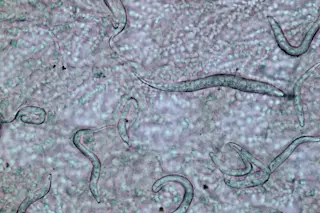Worms are decomposers. Many survive by breaking down dead things — dead bacteria, dead plants, dead animals, dead anything. So, they must be accustomed to the stench of death. Not so, a new study suggests — not when the dead organism is another worm.
Published in Current Biology, the study states that C. elegans roundworms react adversely to the smell of a deceased counterpart. Not only does this smell invoke a behavioral response of corpse avoidance, but it also invokes a physiological response of increased short-term fertility and decreased long-term fitness and lifespan.
“Caenorhabditis elegans prefers to avoid dead conspecifics,” or deceased members of the same species, the authors state in the study, with the worms reacting to death with a range of “aversion” and “survival” responses. Taken together, the results reveal a new signaling mechanism that’s available to worms and possibly other organisms, too, as a means of detecting ...















